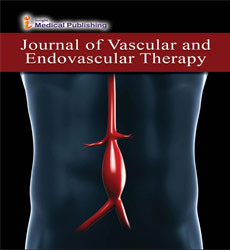Postoperative Care After Vascular Surgery: Facilitating Recovery and Preventing Complications
Alejandro Garcia
Department of Vascular Surgery, Johns Hopkins University, Baltimore, USA
Published Date: 2024-08-22DOI10.36648/2634-7156.9.4.212
Alejandro Garcia*
Department of Vascular Surgery, Johns Hopkins University, Baltimore, USA
- *Corresponding Author:
- Alejandro Garcia
Department of Vascular Surgery, Johns Hopkins University, Baltimore,
USA,
E-mail: agarcia@gmail.com
Received date: July 22, 2024, Manuscript No. IPJVES-24-19706; Editor assigned date: July 25, 2024, PreQC No. IPJVES-24-19706 (PQ); Reviewed date: August 08, 2024, QC No. IPJVES-24-19706; Revised date: August 15, 2024, Manuscript No. IPJVES-24-19706 (R); Published date: August 22, 2024, DOI: 10.36648/2634-7156.9.4.212
Citation: Garcia A (2024) Postoperative Care After Vascular Surgery: Facilitating Recovery and Preventing Complications. J Vasc Endovasc Therapy Vol.9 No.4: 212.
Description
Vascular surgery surround a range of procedures aimed at treating conditions affecting the blood vessels, including arteries and veins. Common procedures include carotid endarterectomy, bypass surgery, aneurysm repair and endo venous laser treatment. While the surgical intervention itself is vital for restoring blood flow and preventing complications, effective postoperative care is essential for ensuring optimal recovery and minimizing the risk of complications. Postoperative care plays a main role in the overall success of vascular surgery. After any surgical procedure, the body undergoes a healing process that requires careful monitoring and management. Proper postoperative care not only aids in recovery but also helps identify potential complications early, allowing for timely intervention. This care typically involves a multidisciplinary approach, involving surgeons, nurses, physical therapists and other healthcare professionals.
Continuous monitoring of vital signs such as heart rate, blood pressure, temperature and oxygen saturation is essential in the immediate postoperative period. This monitoring helps identify any signs of complications such as infection, bleeding, or thrombosis. The surgical site should be regularly inspected for signs of infection, swelling, or excessive bleeding. Patients and caregivers should be educated on what to look for and when to contact healthcare providers. Effective pain control is vital for recovery. Postoperative pain can be managed through medications, which may include opioids, Nonsteroidal Anti- Inflammatory Drugs (NSAIDs), or local anesthetics.
Patients should communicate their pain levels to healthcare providers, who can adjust medications accordingly to ensure comfort while minimizing the risk of complications related to over medication. Adequate hydration is vital for recovery, particularly after vascular surgery. Patients may initially receive fluids intravenously, transitioning to oral intake as tolerated. A well-balanced diet rich in protein, vitamins and minerals supports healing. Healthcare providers may provide dietary recommendations tailored to the individual’s needs. Early mobilization is encouraged to prevent complications such as Deep Vein Thrombosis (DVT) and Pulmonary Embolism (PE). Patients may be assisted with sitting up, standing and walking within a day or two after surgery.
Physical therapy may be introduced to help patients regain strength and mobility. Tailored exercise programs can improve circulation and speed up recovery. Patients will likely be prescribed medications to prevent blood clots, manage pain and control other underlying conditions such as hypertension or diabetes. It is important for patients to adhere to their medication regimen and understand the purpose of each medication. Regular follow-ups with healthcare providers will help monitor the effectiveness of these medications and make adjustments as necessary. Proper care of the surgical wound is essential to prevent infection and promote healing. Patients should be instructed on how to clean the wound and change dressings if necessary. Signs of infection, such as increased redness, swelling, or discharge, should be reported to healthcare providers immediately. Recovery from surgery can be physically and emotionally challenging. Patients may experience anxiety or depression during this time. Providing support and encouraging open communication about feelings can help. Healthcare providers should assess patients’ emotional well-being and, if needed, refer them to counselling or support groups.
Complications and follow-up
Despite the best care, complications can still arise after vascular surgery. Some of the potential complications include, surgical site infections can occur, particularly in patients with weak immune systems or underlying health conditions. Both internal and external bleeding can occur, necessitating prompt evaluation and intervention. The formation of blood clots in the veins or arteries can lead to serious complications, including PE or graft failure. For procedures involving grafts, complications such as graft occlusion or leakage may occur. Postoperative follow-up is vital for monitoring recovery and preventing complications. Patients should have regular appointments with their healthcare provider to assess healing, adjust medications and perform necessary imaging studies to evaluate blood flow and graft patency. These follow-ups help ensure that any issues are addressed early, leading to better long-term outcomes.
Postoperative care after vascular surgery is integral to the recovery process. By focusing on careful monitoring, effective pain management, nutritional support, early mobilization and thorough wound care, healthcare providers can significantly enhance recovery outcomes for patients. Additionally, being vigilant for potential complications and ensuring regular followup appointments are key components of comprehensive postoperative care. By prioritizing these aspects, patients can enjoy improved healing and a better quality of life following vascular surgery.
Open Access Journals
- Aquaculture & Veterinary Science
- Chemistry & Chemical Sciences
- Clinical Sciences
- Engineering
- General Science
- Genetics & Molecular Biology
- Health Care & Nursing
- Immunology & Microbiology
- Materials Science
- Mathematics & Physics
- Medical Sciences
- Neurology & Psychiatry
- Oncology & Cancer Science
- Pharmaceutical Sciences
